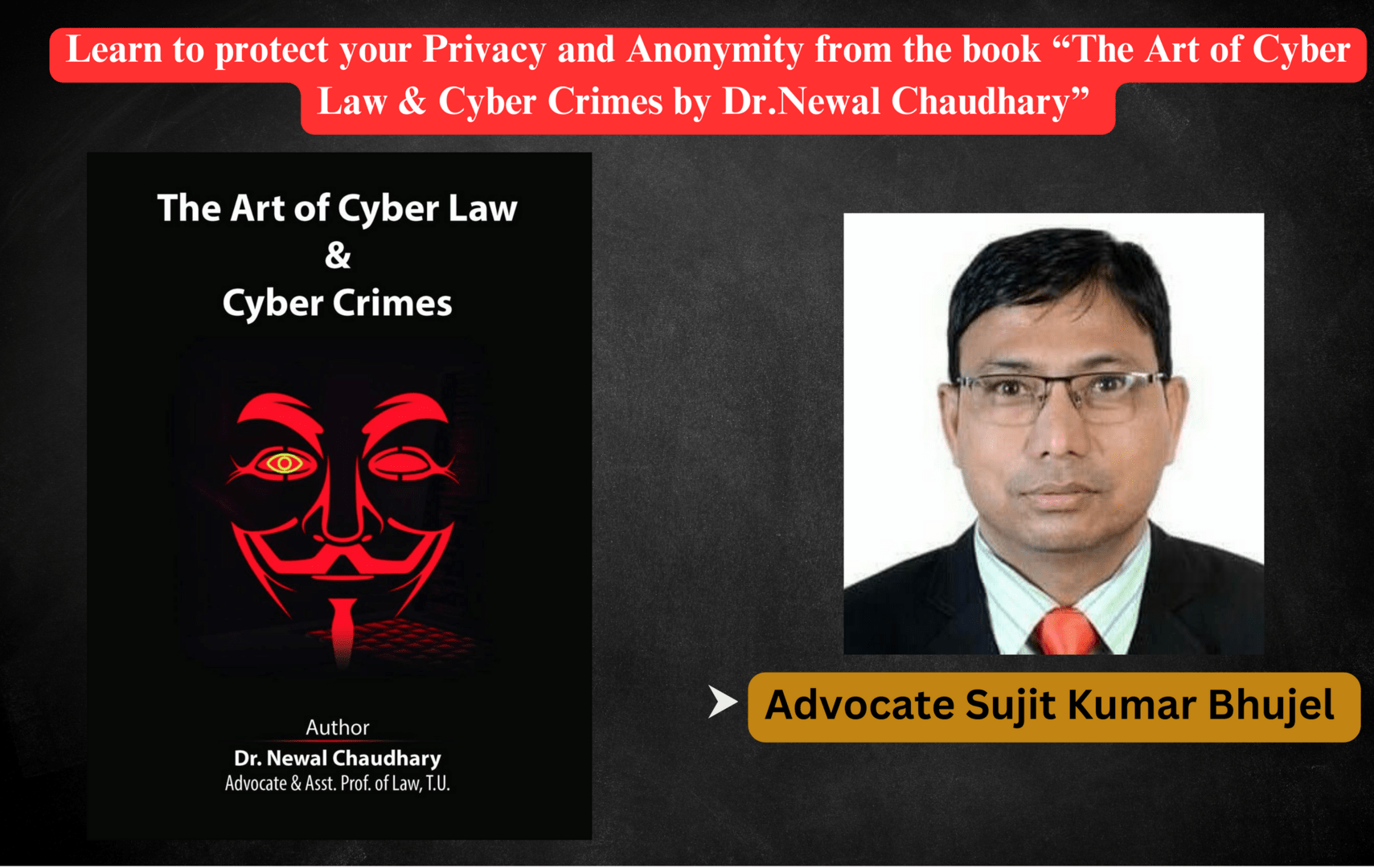Learn to protect your Privacy and Anonymity
From the book “The Art of Cyber Law & Cyber Crimes by Dr. Newal Chaudhary”

The new book "The Art of Cyber Law & Cyber Crimes" by eminent Supreme Court advocate Dr. Newal Chaudhary provides important insights on protecting privacy and anonymity in the digital age. Published by Mission Legal Services Pvt.Ltd, this insightful 1st edition was released in 2023 with a thoughtful foreword by the Campus Chief of Nepal Law Campus, Dr. DN Parajuli. Dr. Newal Chaudhary, an Assistant Professor of Nepal Law Campus and former Executive Director of the Greater Janakpur Area Development Council, draws on his extensive experience advocating cybercrime cases and researching cyber law to emphasize that privacy is not an unattainable myth. With numerous examples from his advocacy work and research, Dr. Chaudhary argues that individuals can and should take steps to protect their privacy and anonymity in the digital sphere. He provides practical tips like using encrypted messaging apps, securing devices with passwords, enabling two-factor authentication, and minimizing unnecessary personal data sharing online.
Dr. Chaudhary also advocates for stronger laws and corporate policies to safeguard individual privacy. As he rightly states, "Privacy is a fundamental human right that is increasingly threatened in the digital age." Companies collect vast amounts of data often without consent, and security breaches expose sensitive information. Dr. Chaudhary warns that losing control over one's personal data can enable surveillance, discrimination, manipulation, and loss of autonomy. However, he remains optimistic that with greater awareness, the adoption of privacy-enhancing tools, and better rules and incentives, individuals can reclaim power over their data and preserve dignity in the digital world. By illuminating the importance of privacy and how to achieve it, Dr. Chaudhary's excellent new book provides a valuable resource for anyone wishing to protect themselves in the information age. The Author has clearly classified that this book is not only a textbook which is for law student but for all the persons who uses the internet in this digital age. From my perspective, it can be stated that this is one of the best books on cyber law and cybercrime which all Nepalese citizens should prefer to read.
In the information age, privacy is a precious and threatened commodity. As Dr. Newal Chaudhary expertly illuminates in his vital new book "The Art of Cyber Law & Cyber Crimes," individuals face unprecedented risks to their privacy through surveillance, data collection, and security breaches. However, with knowledge, tools, and advocacy, we can stem these threats and retain control over our personal data and dignity. Dr. Chaudhary details numerous steps individuals can take to enhance their privacy and anonymity. First, we should minimize our sharing of personal information online. Posting extensive personal details on social media and freely providing data to companies enable profiling, tracking, and exploitation. Be sparing in what you share publicly and limit it to non-sensitive interests and activities. Enable privacy settings on social media and apps to limit data access. On platforms like Facebook, restrict ad targeting, location tracking, face recognition, and profile visibility. Every app request for permissions should be scrutinized. Disable unnecessary location, camera, microphone, and contact access.
Secure your devices with strong passwords and biometric locks. Use passwords with 15+ random characters or passphrases for important accounts. Enable two-factor or multi-factor authentication wherever possible. This requires providing an additional verification method like biometrics or codes sent to your phone when logging in. Beware of phishing attempts trying to trick you into revealing passwords or personal information. Check that emails and messages are from verified senders before clicking links or attachments. Use antivirus software and keep systems patched and updated to prevent malware or unauthorized access. When browsing online, use privacy-focused browsers like Firefox and DuckDuckGo that limit tracking and don't retain search history. Install browser extensions that block ads and trackers like AdBlock Plus, Privacy Badger, and uBlock Origin. Switch on the 'Do Not Track' settings to opt out of tracking cookies. Use a Virtual Private Network (VPN) to encrypt traffic and mask your IP address and location. Be wary of public Wi-Fi, as it allows snooping on unencrypted connections. Either avoid it entirely for sensitive activities or use a VPN to keep data secure. Disable Wi-Fi and Bluetooth when not in use to prevent leaks or attacks. Use the airplane mode in sensitive situations. Carefully manage app permissions and turn off unnecessary access to location, camera, contacts, etc. Disable background app refresh and push notifications to limit data collection. Frequently clear cookies, caches, and browsing history. Avoid using real personal info where possible when creating accounts or filling out forms online. Pay attention to website SSL certification and HTTPS protocol, ensuring connections are secure when submitting data. Provide only essential info and use disposable debit cards when shopping online. Select end-to-end encrypted messaging apps like Signal and WhatsApp for communications. In comparison to Signal and WhatsApp, Dr.Newal Chaudhary States that “Signal should be preferred to be used rather than WhatsApp”. These prevent intermediate access to messages. Encrypt devices and key files or use services like Boxcryptor to protect cloud-stored data. On page 188 Sir Advocate and Assistant Professor Dr.Newal Chaudhary states that Use encrypted VPNs like ProtonMail rather than standard VPN services to hide IP addresses or protect digital privacy. Dr. Chaudhary states that ProtonVPN is best in terms of using any other kind of VPN. Chaudhary writes, "Not all Vpn are created equal and some are more Privacy Focused than others, VPNs that are based in countries with strong Privacy laws, such as Switzerland, are generally considered to be more trustworthy because they are likely to be compelled to hand over user data to law enforcement. Even VPNs with a strict no-logs policy cannot be fully trusted."
Similarly, Dr. Chaudhary in his book has written urging to be extremely cautious of Internet-connected devices like smart home tech, as they can enable surveillance. Disable any unnecessary access permissions and functions. Use separate user accounts on computers for general vs sensitive activities. Enable privacy settings on phones to limit ad tracking and location data sharing. Use Android privacy extensions like XPrivacyLua. For maximum phone security, use privacy-focused operating systems like GrapheneOS rather than standard Android. Minimize the use of services tied to real identity like social media. Employ pseudonyms where possible online. Use identity protection services like DeleteMe to remove public listings of your name, address, etc. This raises the difficulty of profiling and tracking you. Advocate for stronger legal protections around data and privacy. Support companies with ethical data practices like DuckDuckGo and ProtonMail. Call out violations and data exploitation. Lobby government representatives to limit surveillance overreach and mandate privacy standards. While risks are rising, Dr. Chaudhary rightly notes that "privacy is not an unattainable myth." With vigilance, education, tools, and advocacy, we can retain control over our data and integrity as individuals. By heeding the wise counsel in "The Art of Cyber Law & Cyber Crimes," we can navigate the digital world safely and preserve the privacy that is fundamental to freedom and autonomy.
(Bhujel is an Advocate at the Supreme Court of Nepal.)



Leave Comment